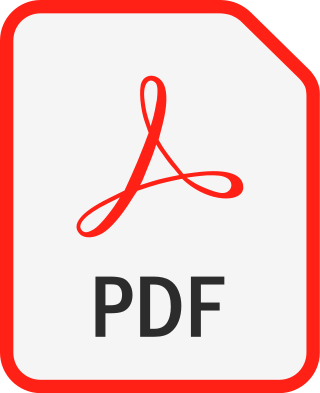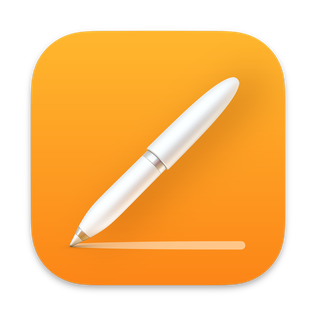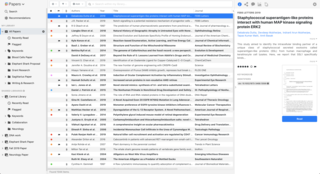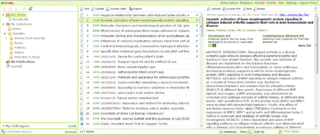
Microsoft Office, or simply Office, is a discontinued family of client software, server software, and services developed by Microsoft. It was first announced by Bill Gates on August 1, 1988, at COMDEX in Las Vegas. Initially a marketing term for an office suite, the first version of Office contained Microsoft Word, Microsoft Excel, and Microsoft PowerPoint. Over the years, Office applications have grown substantially closer with shared features such as a common spell checker, Object Linking and Embedding data integration and Visual Basic for Applications scripting language. Microsoft also positions Office as a development platform for line-of-business software under the Office Business Applications brand.

Portable Document Format (PDF), standardized as ISO 32000, is a file format developed by Adobe in 1992 to present documents, including text formatting and images, in a manner independent of application software, hardware, and operating systems. Based on the PostScript language, each PDF file encapsulates a complete description of a fixed-layout flat document, including the text, fonts, vector graphics, raster images and other information needed to display it. PDF has its roots in "The Camelot Project" initiated by Adobe co-founder John Warnock in 1991.

Adobe Photoshop is a raster graphics editor developed and published by Adobe Inc. for Windows and macOS. It was originally created in 1987 by Thomas and John Knoll. Since then, the software has become the most used tool for professional digital art, especially in raster graphics editing. The software's name is often colloquially used as a verb although Adobe discourages such use.

FLAC is an audio coding format for lossless compression of digital audio, developed by the Xiph.Org Foundation, and is also the name of the free software project producing the FLAC tools, the reference software package that includes a codec implementation. Digital audio compressed by FLAC's algorithm can typically be reduced to between 50 and 70 percent of its original size and decompresses to an identical copy of the original audio data.

Microsoft Outlook is a personal information manager software system from Microsoft, available as a part of the Microsoft Office and Microsoft 365 software suites. Though primarily an email client, Outlook also includes such functions as calendaring, task managing, contact managing, note-taking, journal logging and web browsing. And has also become a popular email client for many businesses.

WPS Office is an office suite for Microsoft Windows, macOS, Linux, iOS, Android, and HarmonyOS developed by Zhuhai-based Chinese software developer Kingsoft. It also comes pre-installed on Fire tablets. WPS Office is made up of three primary components: WPS Writer, WPS Presentation, and WPS Spreadsheet. By 2022, WPS Office reached a number of more than 494 million monthly active users and over 1.2 billion installations.
Mellel is a word processor for Mac OS X, developed since 2002 and marketed as especially suited for technical and academic writers, and for writers with long, complex documents. It is made by Mellel AAR, a small software company. New features are added to the program every few months, many of which come from user suggestions. Its closest competitor is Nisus Writer Pro.

iWork is an office suite of applications created by Apple Inc. for its macOS and iOS operating systems, and also available cross-platform through the iCloud website.

Pages is a word processor developed by Apple Inc. It is part of the iWork productivity suite and runs on the macOS, iPadOS and iOS operating systems. It is also available on iCloud on the web. The first version of Pages was released in February 2005. Pages is marketed by Apple as an easy-to-use application that allows users to quickly create documents on their devices. A number of Apple-designed templates comprising different themes are included with Pages.
This is an overview of software support for the OpenDocument format, an open document file format for saving and exchanging editable office documents.

Zotero is a free and open-source reference management software to manage bibliographic data and related research materials, such as PDF files. Features include web browser integration, online syncing, generation of in-text citations, footnotes, and bibliographies, an integrated PDF reader and note editor, as well as integration with the word processors Microsoft Word, LibreOffice Writer, and Google Docs. It was originally created at the Center for History and New Media at George Mason University, and, as of 2021, is developed by the non-profit Corporation for Digital Scholarship.
The following tables compare notable reference management software. The comparison includes older applications that may no longer be supported, as well as actively-maintained software.
The following is a comparison of e-book formats used to create and publish e-books.

BibDesk is an open-source reference management software package for macOS, used to manage bibliographies and references when writing essays and articles. It can also be used to organize and maintain a library of documents in PDF format and other formats. It is primarily a BibTeX front-end for use with LaTeX, but also offers external bibliographic database connectivity for importing, a variety of means for exporting, and capability for linking to local documents and automatically filing local documents. It takes advantage of many macOS features such as AppleScript and Spotlight.

Papers is a reference management software for Mac OS X and Windows, used to manage bibliographies and references when writing essays and articles. It is primarily used to organize references and maintain a library of PDF documents and also provides a uniform interface for document repository searches, metadata editing, full screen reading and a variety of ways to import and export documents.

WizFolio was a web-based reference management software for researchers to manage, share their research and academic papers and generate citations in scholarly writings. It used plug-ins to collect bibliographic information, videos and patents from webpages. WizFolio ceased to be available at the end of 2017.

Citavi is a program for reference management and knowledge organization for Microsoft Windows published by Swiss Academic Software in Wädenswil, Switzerland. Citavi is very widely used in Germany, Austria, and Switzerland, with site licenses at most universities, many of which offer training sessions and settings files for Citavi.
ReadCube is a technology company developing software for researchers, publishers, academic and commercial organizations. ReadCube's product line includes the reference manager ReadCube Papers, Anywhere Access and custom services for publishers. It is part of the Digital Science's portfolio.

FBReader is an e-book reader for Linux, Microsoft Windows, Android, and other platforms.










